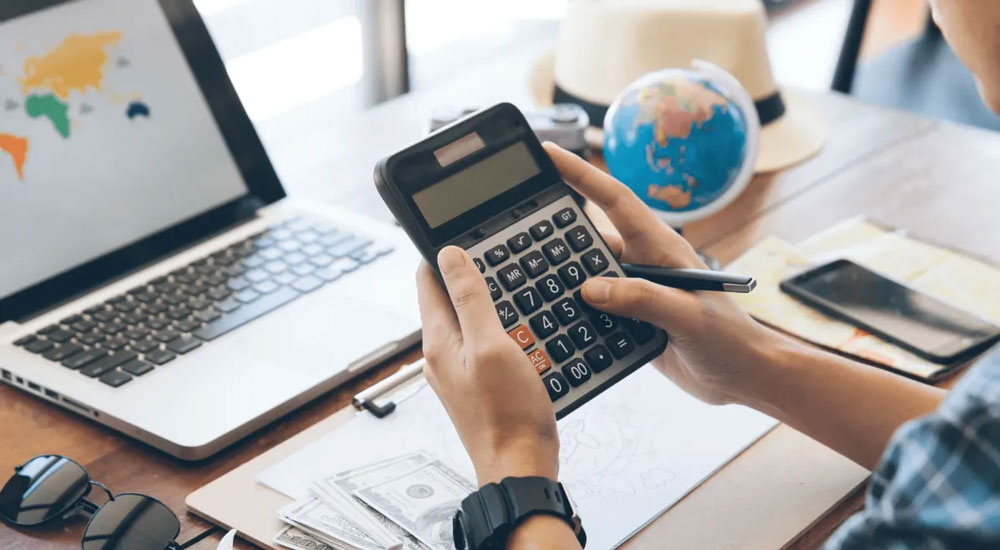
Digital nomads may appear to be on an eternal vacation, but in truth, they are generally simply financially savvy.
They’ve learnt how to stretch a limited budget, allowing them to travel the world with ease.
I’ve spent a long time trying to figure out how they do it.
It’s not about having a massive paycheck.
It’s managing resources creatively, questioning old spending habits, and finding ways to stretch every dollar.
If you’re curious about how to live with more freedom on a lean budget, here are some of the top tips I’ve discovered.
- Stick with geographic arbitrage.
One of the most common strategies used by digital nomads is to earn a strong currency (such as USD, GBP, or EUR) while living in low-cost countries.
This concept is often referred to as “geographic arbitrage.” It may appear complicated, but it simply means spending in areas where your money buys more.
I’ve watched friends slash their monthly expenses by half simply by working remotely in countries where housing, food, and transportation are cheaper.
Local dishes might cost only a few dollars, and rent can be a fraction of what you’d pay in London or New York.
It’s a powerful strategy if you can work anywhere and still bring in a steady income.
- Automate your savings and budgeting
When you’re constantly on the move, it’s easy to lose track of finances.
Between currency conversions, time zone differences, and the excitement of exploring new places, saving money can slip to the bottom of your to-do list.
That’s why many digital nomads automate their finances.
Set up automatic transfers to a savings account, so a certain percentage of your income is safely stashed away every month.
Use budgeting tools that track and categorize your spending without any extra hassle. Fewer manual steps mean fewer chances to forget or procrastinate.
- Prioritize experiences over possessions
Minimal luggage space forces them to become very selective.
Instead of accumulating physical stuff, they invest in experiences, cultural immersion, and personal connections.
By doing this, they often find deeper fulfillment and spend less money in the long run.
I’ve tested this idea by putting my money toward experiences rather than random purchases. It’s been eye-opening.
The energy I used to spend on buying and maintaining things now goes into finding local tours, exploring hidden hiking trails, or discovering the best street food in town.
Joshua Becker once noted that experiences deliver more lasting happiness than material items.
- Embrace minimalism
This ties closely to prioritizing experiences. Minimalism is about living with only the essentials.
It doesn’t mean you can’t enjoy nice things; it just means being more deliberate about what you buy.
When you have to fit all your belongings into a suitcase, you naturally ask yourself, “Do I really need this?”
I used to overpack, only to realize that half my clothes never saw the light of day. I quickly learned to pare down and found it strangely liberating.
Owning fewer items not only saves money, it also frees up your mental space.
With minimalism, you stop spending on duplicates or pointless gadgets, and start focusing on the few items that genuinely make your life better.
- Master the art of negotiating.
Negotiation is a skill they use to stretch their budget farther.
You’d be surprised how often you can negotiate, whether it’s over the price of a market souvenir or a discount on long-term accommodation.
In many parts of the world, bargaining is expected and encouraged.
I learned this lesson on my first trip to Asia, where a friendly local explained that the initial price quoted for tourists is often inflated.
A bit of polite back-and-forth not only saved me money but also led to fun conversations.
If you never ask for discounts, you’re probably leaving money on the table. Over time, those small savings can make a big difference.
- Utilize travel hacking for free flights and stays
If you’ve never dabbled in travel hacking, consider giving it a try.
Digital nomads often rely on airline miles, hotel loyalty programs, and credit card rewards to reduce travel costs.
The main idea is to earn points by putting regular expenses on reward cards, then redeem those points for free or heavily discounted flights, accommodations, or upgrades.
When I started using a rewards credit card, I was amazed at how quickly points piled up. The trick is to find a single card that fits your needs, use it responsibly, and pay off the balance each month.
Before I knew it, I scored a nearly free flight to a dream destination. It was one of those moments where I realized how powerful these strategies can be.
- Earn passive income
Many digital nomads don’t rely on a single salary.
They diversify income streams, especially through passive income options like affiliate marketing, blogging, YouTube videos, or digital courses.
These require upfront effort, but once they’re set, they bring in recurring revenue even when you’re busy exploring.
I dipped my toes into creating an online course. It was a lot of work: planning content, filming videos, and dealing with the technical side of things.
However, once it launched, sales occasionally popped in while I was asleep.
Passive income is building something that generates revenue with minimal ongoing effort.
It won’t make you rich overnight, but it can help stabilize your finances if you’re a freelancer or remote worker seeking more freedom.
- Adopt a flexible approach to healthcare
One huge question that comes up is healthcare. No one wants to be caught off-guard by a hefty medical expense in a foreign nation.
That is why many people choose global health insurance plans or flexible coverage designed for travellers.
Look for nomad-friendly policies that cover basic medical needs worldwide. Some travelers also take advantage of medical tourism by scheduling dental work or checkups in places known for high-quality but affordable care.
I’ve met travelers who save thousands by getting essential procedures in countries where the cost of living is lower.
Having some coverage provides peace of mind so you can focus on new experiences instead of worrying about “what if” scenarios.
Conclusion: less money, more freedom
Digital nomads prove that you don’t need a giant paycheck to live an adventurous and fulfilling life.
By being intentional about the way they spend and save, they manage to build a lifestyle that offers freedom and growth.
It’s not always glamorous. Working from a beach often means you’re troubleshooting shaky Wi-Fi.
Negotiating rent in a foreign language can be awkward at first. And sticking to a budget might take discipline.
Yet, for many, the benefits far outweigh the challenges.
If there’s one lesson I’ve learned, it’s that thriving on less is entirely possible.
It’s about mindset, planning, and the willingness to question old habits. You can incorporate these principles wherever you live.
Whether you want to travel the world or just bring more freedom into your daily routine, these hacks might be your ticket to doing more with what you already have.















